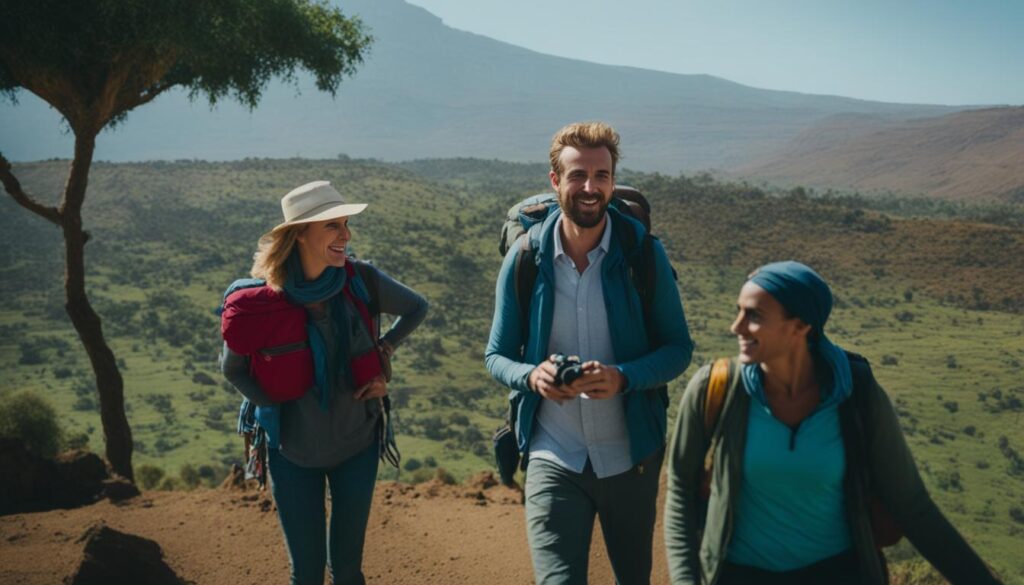Is Ethiopia Safe for Tourists?
Did you know that the U.S. Department of State advises reconsidering travel to Ethiopia? With sporadic violent conflict, civil unrest, crime, communications disruptions, terrorism, and kidnapping in specific areas of the country, it’s important for tourists to be well-informed about the safety situation before planning their trip.
While Ethiopia is a country rich in history, culture, and natural wonders, it also faces security challenges that can impact the safety of travelers. Let’s delve into the details to understand the current state of safety and what precautions tourists should take before visiting this remarkable destination.
- Reconsider travel to Ethiopia due to sporadic violent conflict, civil unrest, crime, communications disruptions, terrorism, and kidnapping in specific areas of the country.
- The Tigray Region, Afar-Tigray border areas, and Amhara Region are high-risk areas due to violent conflict and civil unrest.
- Other regions, including Gambella and Benishangul Gumuz Regions, Oromia Region, and the border areas with Somalia, Sudan, South Sudan, and Kenya also have travel restrictions and safety concerns.
- The security situation in the capital city of Addis Ababa is stable, but other areas of Ethiopia may experience sporadic violent conflict and civil unrest.
- To travel to Ethiopia, it is recommended to monitor local media, be aware of surroundings, carry identification documents, have evacuation plans that do not rely on U.S. government assistance, enroll in the Smart Traveler Enrollment Program (STEP), and follow the Department of State on social media for updates.
Key Takeaways:
- Travel to Ethiopia is advised to be reconsidered due to various security challenges.
- Specific regions and border areas, such as Tigray, Amhara, Gambella, and Oromia, have travel restrictions and safety concerns.
- Tourists should monitor local media, carry identification documents, and have evacuation plans that do not rely on U.S. government assistance.
- Enrolling in the Smart Traveler Enrollment Program (STEP) and following the Department of State on social media can provide important updates and information.
- Being vigilant, aware of surroundings, and avoiding high-risk areas are essential for the safety of tourists in Ethiopia.
Travel Advisory for Specific Regions and Border Areas in Ethiopia
When planning your trip to Ethiopia, it’s crucial to be aware of specific regions and border areas that have travel advisories due to safety concerns. These advisories are put in place to ensure the well-being and security of travelers. Let’s take a closer look at the regions and areas you should be cautious about:
Tigray Region and Border with Eritrea
The Tigray Region and the border with Eritrea are strictly advised against travel due to sporadic violent conflict, civil unrest, and crime. It’s important to note that border roads with Eritrea are closed, and conditions at the border can change without notice.
Afar-Tigray Border Area
The Afar-Tigray border area is restricted for travel due to sporadic violent conflict, civil unrest, and crime. Exercise caution and avoid this area until the situation stabilizes.
Amhara Region
The Amhara Region is currently off-limits for travel due to sporadic violent conflict and civil unrest. Conflict and violence have been reported in towns and villages along major highways and cities such as Lalibela, Bahir Dar, and Gondar. It’s advisable to avoid traveling to this region until further notice.
Gambella and Benishangul Gumuz Regions
The Gambella and Benishangul Gumuz Regions are restricted for travel due to crime, kidnapping, ethnically motivated violence, and sporadic violent conflict. It’s important to prioritize safety and avoid these regions.
Specific Areas within the Oromia Region
Specific areas within the Oromia Region, such as Horro-Guduru Wollega, East Wollega, West Wollega, Kelem Wollega, Illubabor, and Bale, have travel restrictions due to sporadic violent conflict, civil unrest, and ethnically motivated violence. Stay informed about the situation in these areas before considering travel.
Southern Nations and National People (SNNP) Region
The Southern Nations and National People (SNNP) Region has restricted areas, including Gedeo and Konso zones, and the Amaro and Derashe special woredas, due to sporadic violent conflict, civil unrest, and ethnically motivated violence. Avoid these areas to ensure your safety.
Border Areas with Somalia, Sudan, South Sudan, and Kenya
The border areas with Somalia, Sudan, South Sudan, and Kenya also have travel restrictions due to terrorism, kidnapping, and ethnic conflicts. It’s essential to prioritize your safety and avoid these border areas.
Security Measures and Precautions for Traveling in Ethiopia
When planning a trip to Ethiopia, it’s essential to prioritize your safety and take necessary precautions. By following these security measures and tips, you can enjoy safe and memorable travel experiences in this beautiful country.
Monitor Local Media and Stay Alert
To stay informed about the latest developments and potential safety concerns, it is vital to monitor local media for breaking events and updates. Being aware of your surroundings and staying alert, especially in locations frequented by U.S. citizens and foreign travelers, can help you avoid potential risks.
Carry Copies of Important Documents
Carry a copy of your passport and visa while keeping the originals securely stored in a hotel safe. In the event of loss or theft, having copies readily available can expedite the process of obtaining replacement documents and facilitate your travel arrangements.
Have Evacuation Plans and Enroll in STEP
It’s crucial to have evacuation plans that do not rely solely on U.S. government assistance. Unforeseen circumstances may arise, and having alternative contingency plans in place can ensure your safety. Additionally, enrolling in the Smart Traveler Enrollment Program (STEP) allows you to receive important alerts and makes it easier for authorities to locate you in case of an emergency.
Follow Department of State on Social Media
Stay connected and receive additional updates and information by following the U.S. Department of State on social media platforms such as Facebook and Twitter. They provide valuable insights and guidance related to travel advisories and safety tips.
Review the Country Security Report and Create a Contingency Plan
Before your trip, take the time to review the Country Security Report for Ethiopia. This comprehensive document provides an overview of security conditions and potential risks. It’s wise to create a contingency plan that outlines steps to be taken in emergency situations, ensuring you are prepared for any unforeseen circumstances.
Specific Safety Measures for High-Risk Areas
For specific high-risk areas like the Tigray, Amhara, and Oromia regions, there are additional safety precautions to consider:
- Follow local authorities’ instructions and guidance.
- Regularly monitor local media for updates on the security situation.
- Register with relevant safety organizations to receive timely alerts and support.
Remember, your safety is of utmost importance during your trip to Ethiopia. By staying informed, being prepared, and taking necessary precautions, you can enjoy a safe and fulfilling travel experience in this captivating country.
Overview of Safety Concerns in Ethiopia

When considering travel to Ethiopia, it is important to be aware of the security challenges that exist throughout the country. Ethiopia experiences sporadic violent conflicts, civil unrest, and terrorism, which can impact the safety of travelers.
Ethnic tensions and territorial disputes further contribute to the volatile and unpredictable nature of the security situation in different regions. Violent clashes between armed groups, both among themselves and with security forces, are not uncommon.
Several regions in Ethiopia, including the Amhara region, Tigray region, Oromia region, Gambella region, Benishangul Gumuz region, and Somali region, have documented higher levels of violence, crime, and unrest. These areas should be approached with caution, and travelers should exercise heightened awareness of their surroundings.
Kidnapping is also a risk in Ethiopia, particularly in the Somali region, border areas with Kenya, and certain areas of Oromia. It is crucial to remain vigilant and take appropriate precautions to minimize the risk of such incidents.
“Ethiopia faces security challenges, including sporadic violent conflicts, civil unrest, and terrorism. Travelers should exercise caution, be aware of their surroundings, and stay informed about the local security situation.”
To ensure a safe and enjoyable trip to Ethiopia, it is essential to stay informed about the security conditions in the areas you plan to visit. Regularly monitoring local news and heeding the advice of local authorities can provide valuable insights into the current security situation. Additionally, enrolling in the Smart Traveler Enrollment Program (STEP) can help receive critical updates and allow the U.S. Embassy to assist in case of emergency.
Travel Advisory for Specific Regions and Border Areas in Ethiopia
When traveling to Ethiopia, it is important to be aware of specific regions and border areas that pose higher security risks. The table below provides an overview of these areas:
| Region/Area | Reason for Travel Restriction |
|---|---|
| Tigray Region and Eritrean border | Sporadic violent conflict, civil unrest, and crime |
| Afar-Tigray border area | Sporadic violent conflict, civil unrest, and crime |
| Amhara Region | Sporadic violent conflict and civil unrest |
| Gambella and Benishangul Gumuz Regions | Crime, kidnapping, and sporadic violent conflict |
| Oromia Region (specific areas) | Sporadic violent conflict, civil unrest, and ethnically motivated violence |
| Southern Nations and National People (SNNP) Region (specific areas) | Sporadic violent conflict, civil unrest, and ethnically motivated violence |
| Border areas with Somalia, Sudan, South Sudan, and Kenya | Terrorism, kidnapping, and ethnic conflicts |
Travelers should strictly adhere to the travel restrictions and avoid these high-risk areas to ensure their safety in Ethiopia.
By staying informed, exercising caution, and respecting the travel advisories, tourists can still have a memorable and enjoyable experience while exploring Ethiopia’s rich history, culture, and natural wonders.
Conclusion
While planning your trip to Ethiopia, it’s crucial to prioritize your safety as the security situation can vary across different regions. It’s important to carefully consider the travel advisories provided by the U.S. Department of State and stay informed about the latest updates through local media.
To enhance your safety, make sure to carry identification documents with you at all times and have a well-prepared evacuation plan that doesn’t rely on government assistance. Enrolling in the Smart Traveler Enrollment Program (STEP) will provide you with important alerts and assist in locating you during emergencies.
Remaining vigilant and aware of your surroundings is essential. Avoid high-risk areas, especially regions like the Tigray, Amhara, and Oromia, which have reported sporadic violent conflict, civil unrest, and ethnically motivated violence. By taking necessary precautions and following local authorities’ advice, you can still experience Ethiopia’s rich cultural heritage and natural beauty.
Remember, your safety is our top priority. By staying informed, well-prepared, and cautious, you can make the most of your trip to Ethiopia and create unforgettable memories.





